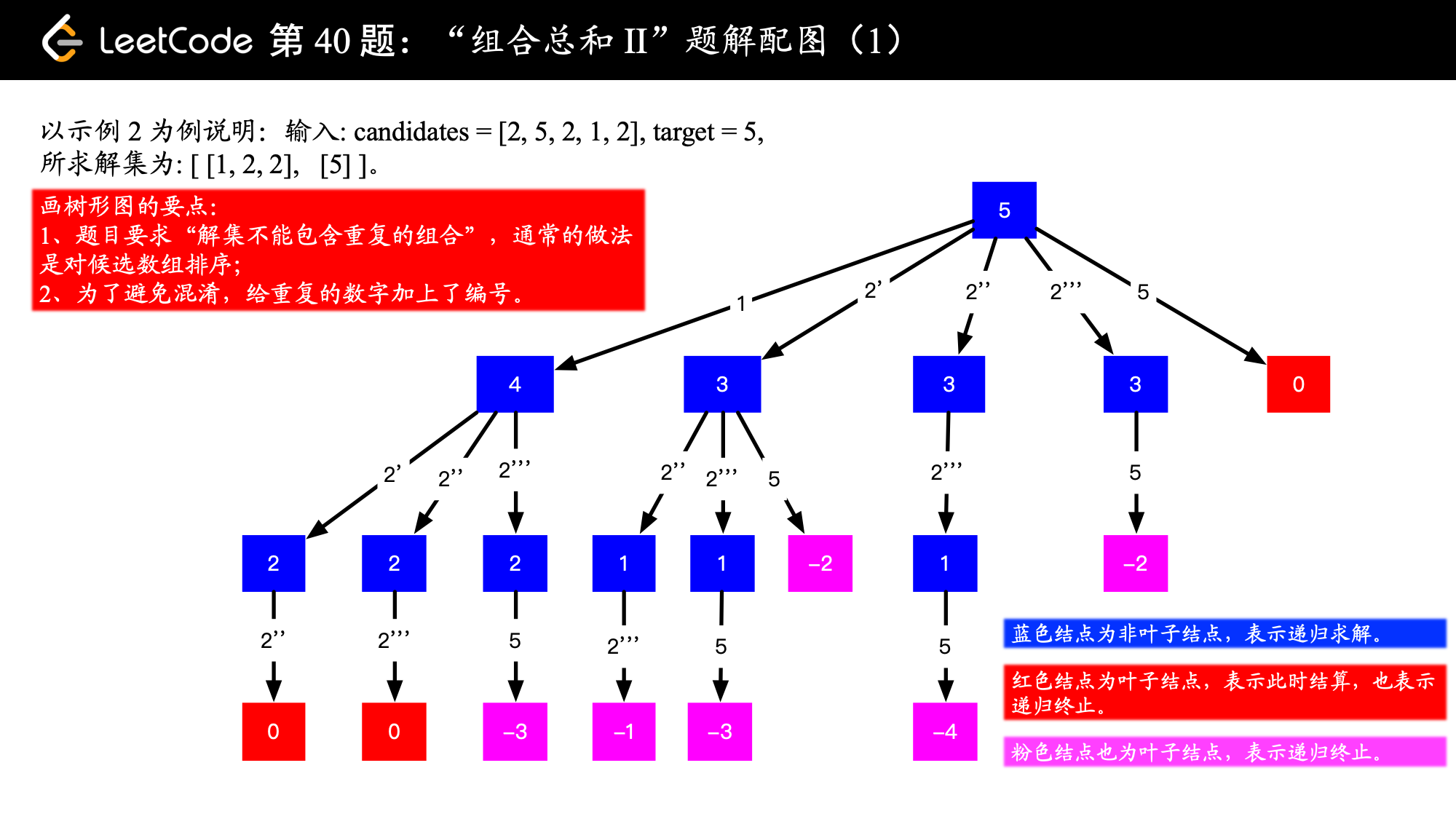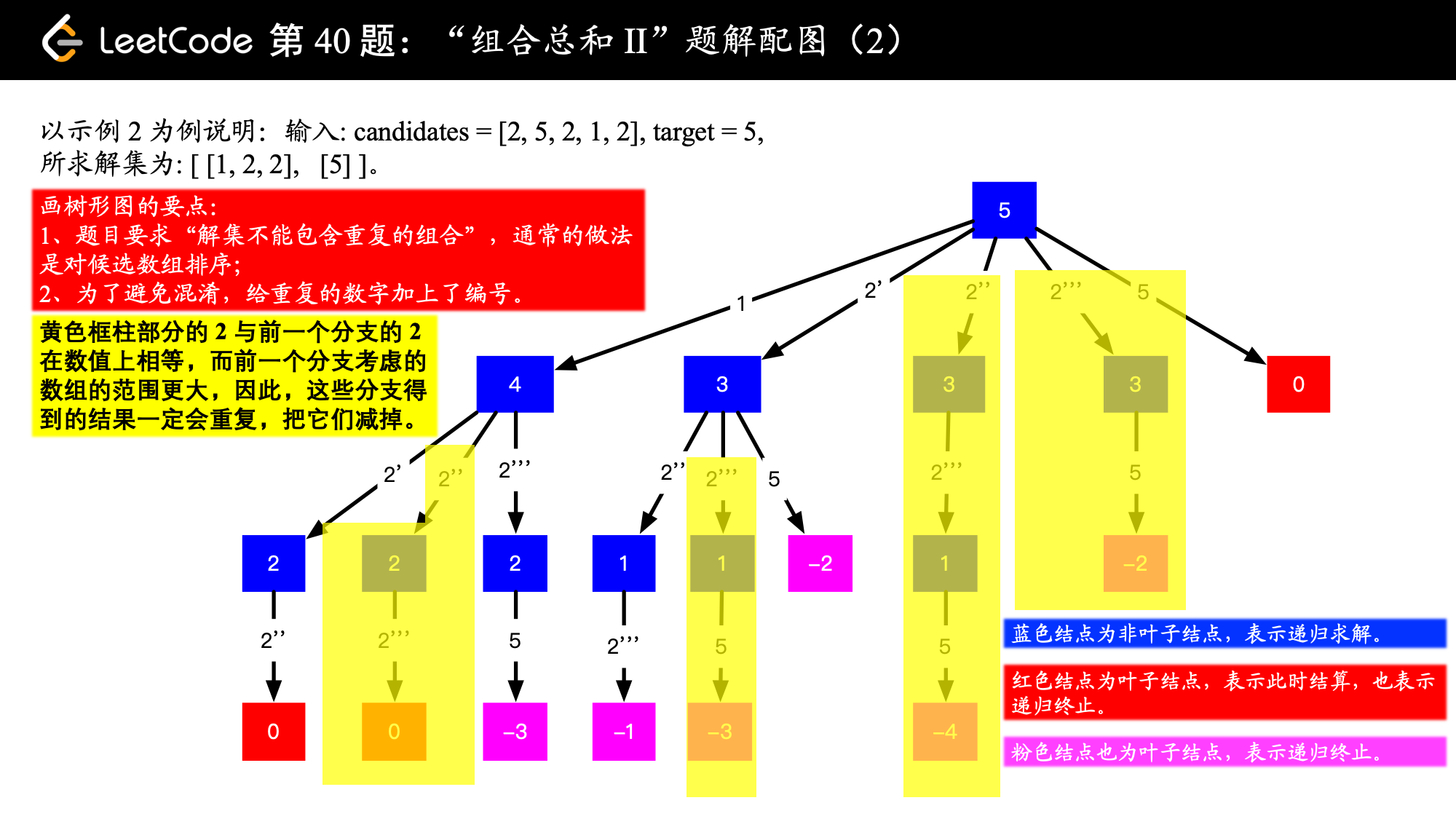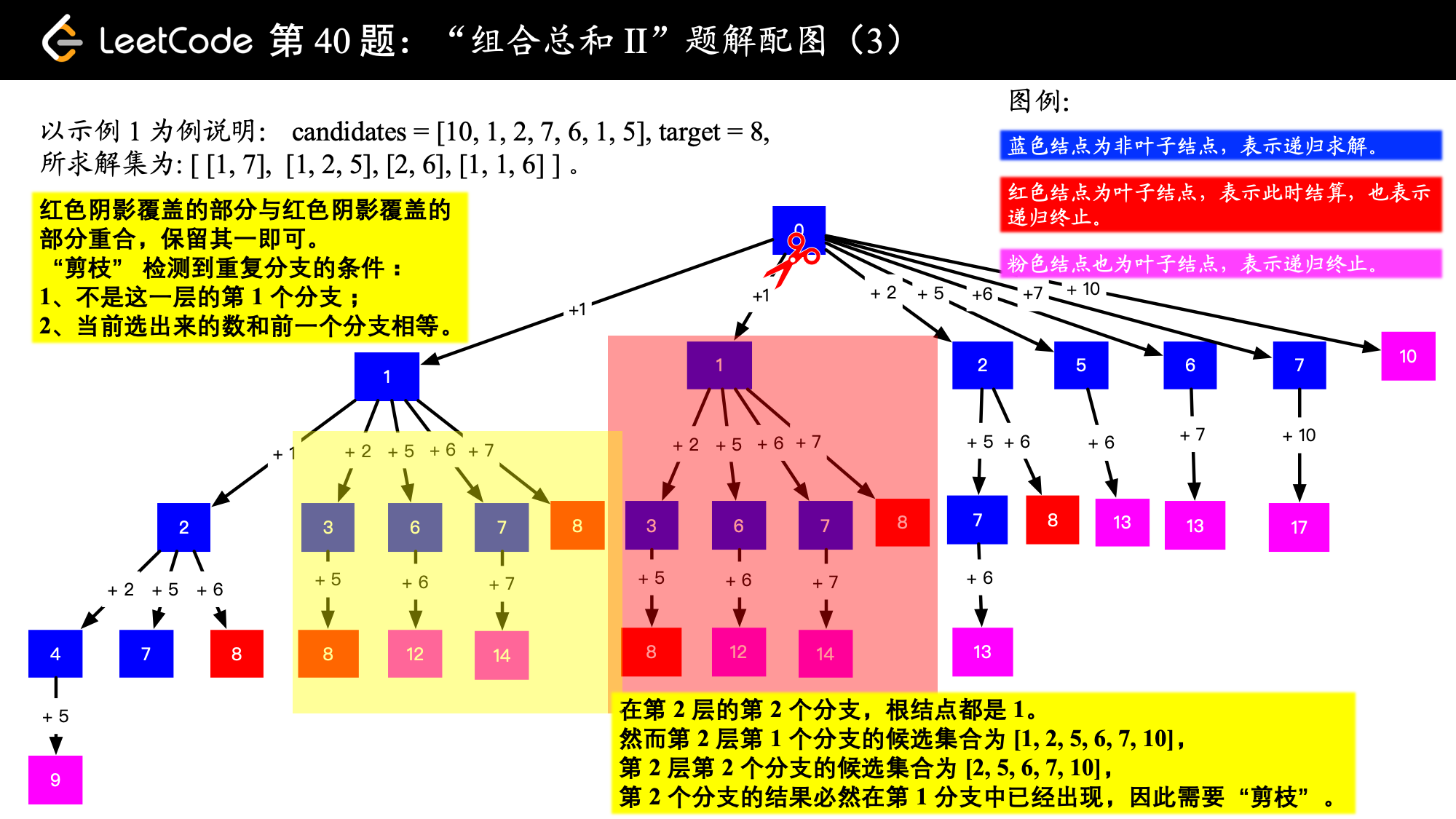LeetCode 第 40 题:“组合总和 II”题解
题解地址:回溯算法 + 剪枝(Python 代码、Java 代码)。
说明:文本首发在力扣的题解版块,更新也会在第 1 时间在上面的网站中更新,这篇文章只是上面的文章的一个快照,您可以点击上面的链接看到其他网友对本文的评论。
传送门:40. 组合总和 II。
给定一个数组 candidates 和一个目标数 target ,找出 candidates 中所有可以使数字和为 target 的组合。
candidates 中的每个数字在每个组合中只能使用一次。
说明:
所有数字(包括目标数)都是正整数。 解集不能包含重复的组合。 示例 1:
输入: candidates = [10,1,2,7,6,1,5], target = 8, 所求解集为: [ [1, 7], [1, 2, 5], [2, 6], [1, 1, 6] ] 示例 2:
输入: candidates = [2,5,2,1,2], target = 5, 所求解集为: [ [1,2,2], [5] ]
回溯算法 + 剪枝(Python 代码、Java 代码)
这道题与上一问的区别在于:
- 第 39 题:candidates 中的数字可以无限制重复被选取。
- 第 40 题:candidates 中的每个数字在每个组合中只能使用一次。
编码的不同,就在于,下一层递归的起始索引不一样。
- 第 39 题:还从候选数组的当前索引值开始。
- 第 40 题:从候选数组的当前索引值的下一位开始。
相同之处:解集不能包含重复的组合。
告诉我们对数组先排序是有必要的。
本题解接着它上一个问题的思路。如果读者觉得有必要,可以先阅读我为「力扣」第 39 题:组合总和这道题编写的题解《回溯算法 + 剪枝(Python 代码、Java 代码)》。
思路分析:
这道题其实比上一问更简单,思路是:
以 target 为根结点,依次减去数组中的数字,直到小于 或者等于 ,把等于 的结果记录到结果集中。
当然你也可以以 为根结点,依次加上数组中的数字,直到大于 target 或者等于 target,把等于 target 的结果记录到结果集中。
- “解集不能包含重复的组合”,就暗示我们得对数组先排个序(“升序”或者“降序”均可,下面示例中均使用“升序”)。
- “candidates 中的每个数字在每个组合中只能使用一次”,那就按照顺序依次减去数组中的元素,递归求解即可:遇到 就结算且回溯,遇到负数也回溯。
candidates中的数字可以重复,可以借助「力扣」第 47 题:全排列 II 的思想,在搜索的过程中,找到可能发生重复结果的分支,把它剪去。
(温馨提示:下面的幻灯片中,有几页上有较多的文字,可能需要您停留一下,可以点击右下角的后退 “|◀” 或者前进 “▶|” 按钮控制幻灯片的播放。)
 ,
,
参考代码 1:以 target 为根结点,依次减去数组中的数字,直到小于 或者等于 ,把等于 的结果记录到结果集中。
Python 代码:
from typing import List
class Solution:
def combinationSum2(self, candidates: List[int], target: int) -> List[List[int]]:
size = len(candidates)
if size == 0:
return []
candidates.sort()
res = []
self.__dfs(candidates, size, 0, [], target, res)
return res
def __dfs(self, candidates, size, start, path, residue, res):
if residue == 0:
res.append(path[:])
return
for index in range(start, size):
if candidates[index] > residue:
break
# 剪枝的前提是数组升序排序
if index > start and candidates[index - 1] == candidates[index]:
# [1, 1, 2, 5, 6, 7, 10]
# 0 号索引的 1 ,从后面 6 个元素中搜索
# 1 号索引也是 1 ,从后面 5 个元素(是上面 6 个元素的真子集)中搜索,这种情况显然上面已经包含
continue
path.append(candidates[index])
# 这里要传入 index + 1,因为当前元素不能被重复使用
# 如果 index + 1 越界,传递到下一个方法中,什么也不执行
self.__dfs(candidates, size, index + 1, path, residue - candidates[index], res)
path.pop()
Java 代码:
import java.util.ArrayList;
import java.util.Arrays;
import java.util.List;
import java.util.Stack;
public class Solution {
// residue 表示剩余,这个值一开始等于 target,基于题目中说明的"所有数字(包括目标数)都是正整数"这个条件
// residue 在递归遍历中,只会越来越小
private void findCombinationSum2(int[] candidates, int begin, int len, int residue, Stack<Integer> stack, List<List<Integer>> res) {
if (residue == 0) {
res.add(new ArrayList<>(stack));
return;
}
for (int i = begin; i < len && residue - candidates[i] >= 0; i++) {
// 这一步之所以能够生效,其前提是数组一定是排好序的,这样才能保证:
// 在递归调用的统一深度(层)中,一个元素只使用一次。
// 这一步剪枝操作基于 candidates 数组是排序数组的前提下
if (i > begin && candidates[i] == candidates[i - 1]) {
continue;
}
stack.add(candidates[i]);
// 【关键】因为元素不可以重复使用,这里递归传递下去的是 i + 1 而不是 i
findCombinationSum2(candidates, i + 1, len, residue - candidates[i], stack, res);
stack.pop();
}
}
public List<List<Integer>> combinationSum2(int[] candidates, int target) {
int len = candidates.length;
List<List<Integer>> res = new ArrayList<>();
if (len == 0) {
return res;
}
// 先将数组排序,这一步很关键
Arrays.sort(candidates);
findCombinationSum2(candidates, 0, len, target, new Stack<>(), res);
return res;
}
public static void main(String[] args) {
int[] candidates = {10, 1, 2, 7, 6, 1, 5};
int target = 8;
Solution solution = new Solution();
List<List<Integer>> combinationSum2 = solution.combinationSum2(candidates, target);
System.out.println(combinationSum2);
}
}
这里按照用户 @Aspire 提供的思路,给出从 开始,一个使用加法,搜索加到目标数的写法,“前提是排序(升序降序均可)”,然后“剪枝”的操作和上面一样。

参考代码 2:以 为根结点,依次加上数组中的数字,直到大于 target 或者等于 target,把等于 target 的结果记录到结果集中。
C++ 代码:
#include <iostream>
#include <vector>
#include <map>
using namespace std;
class Solution {
public:
vector<int> input;
int target;
vector<vector<int>> result;
vector<int> vc;
void dfs(int index, int sum) {
// index >= input.size() ,写成 index == input.size() 即可
// 因为每次都 + 1,在 index == input.size() 剪枝就可以了
if (sum >= target || index == input.size()) {
if (sum == target) {
result.push_back(vc);
}
return;
}
for (int i = index; i < input.size(); i++) {
if (input[i] > target) {
continue;
}
// 【我添加的代码在这里】:
// 1、i > index 表明剪枝的分支一定不是当前层的第 1 个分支
// 2、input[i - 1] == input[i] 表明当前选出来的数等于当前层前一个分支选出来的数
// 因为前一个分支的候选集合一定大于后一个分支的候选集合
// 故后面出现的分支中一定包含了前面分支出现的结果,因此剪枝
// “剪枝”的前提是排序,升序或者降序均可
if (i > index && input[i - 1] == input[i]) {
continue;
}
vc.push_back(input[i]);
sum += input[i];
dfs(i + 1, sum);
vc.pop_back();
sum -= input[i];
}
}
vector<vector<int>> combinationSum2(vector<int> &candidates, int target) {
// “剪枝”的前提是排序,升序或者降序均可
sort(candidates.begin(), candidates.end());
this->input = candidates;
this->target = target;
dfs(0, 0);
return result;
}
};
int main() {
cout << "LeetCode 第 40 题:组合问题 II" << endl;
Solution solution = Solution();
vector<int> candidates;
candidates.push_back(10);
candidates.push_back(1);
candidates.push_back(2);
candidates.push_back(7);
candidates.push_back(6);
candidates.push_back(1);
candidates.push_back(5);
int target = 8;
vector<vector<int>> res = solution.combinationSum2(candidates, target);
for (int i = 0; i < res.size(); ++i) {
for (int j = 0; j < res[i].size(); ++j) {
cout << res[i][j] << ",";
}
cout << "" << endl;
}
return 0;
}